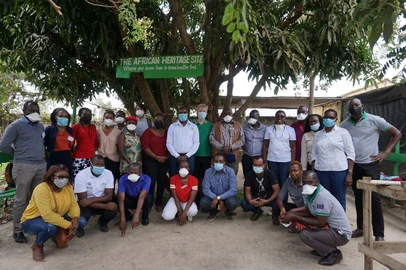Young African researchers discuss in Kenya’s capital Nairobi about smallholder agriculture
December 09, 2021.
On October 5-9, 2021, the RLC Campus Bonn at ZEF organized its first in-person workshop during the Covid-19 pandemic in Nairobi, Kenya, together with its partner Biovision Africa Trust. The workshop was part of a new RLC project which started in 2021 and is being funded by the Volkswagen Foundation.
The workshop’s topic was “Contextualising agricultural interventions and rural development strategies: Addressing smallholders’ livelihoods vis-à-vis market changes, land tenure and soil fertility”. The overall aim was to create a transdisciplinary research-practice platform on the future of East African smallholder agriculture. The platform is to be based on knowledge, expertise and networks of ‘Alternative Nobel Prize’ – awarded individuals and organisations and the global RLC network.
Workshop participants: An international group of experts
In total 21 young researchers from Kenya, Uganda, Ethiopia, Tanzania and Rwanda participated in the workshop together with colleagues from ZEF, Biovision Africa Trust, the International Centre of Insect Physiology and Ecology (icipe), the University of Nairobi as well as the Green Belt Movement and the Wangari Maathai Institute for Peace and Environmental Studies in Nairobi. The ‘Alternative Nobel Prize’ Laureates Tony Rinaudo (Australia), Hans Herren (Washington DC, USA: NB: Hans Herren is the Director of Biovision Foundation. Both were awarded in 2013 “for promoting a safe, secure and sustainable global food supply”) and Tim Crews representing The Land Institute (Kansas, USA) joined the workshop online. Key note speeches were given by Prof. Lennard Olsson from the RLC Campus at the Lund University Centre for Sustainability Studies (LUCSUS), Lund, Sweden, Dr. Jimmy Lamo from the Ugandan National Agricultural Research Organisation (NARO), Namulonge, and Alexander Repenning from the Right Livelihood Foundation, Geneva, Switzerland.
Thematic setting
The workshop participants worked together in three thematic areas, namely:
a) What do farmers really want and need? Empirical findings from Uganda, Kenya and Tanzania;
b) How can change be locally integrated and be pro-poor supporting without compromising exploitation of natural resources?, and
c) What are the lessons learnt from agronomic and institutional actions in the context of land degradation, climate change and changing markets?
Field trip to Grow Biointensive Agriculture Center
On October 7, 2021, a field trip excursion was organized to the Grow Biointensive Agriculture Center of Kenya in Thika, whic is located about 50 km Northeast of Nairobi. The field trip gave the participants an opportunity to learn about innovative, practical and productive ways to conduct sustainable smallholder agriculture. After a welcome speech of the Center's Direcotr Samuel Nderitu, the workshop group visited its gardens, seeds reserve and facilities. The tour made it possible for the participants to directly ask questions to practitioners and trainers ‘in the field’. Lively discussions and exchange took place during this field trip as well as during the entire workshop.
For 2022, the RLC project is planning another workshop on sustainable smallholder agriculture in East Africa; hopefully in-person again.
Take-away messages
Some of the take-away messages from that workshop are the need to re-green mind-sets in order to re-green landscapes and to adapt research more to local contexts.
Moreover, to cite Prof. Wangari Maathai, ‘Alternative Nobel Prize’ Laureate of 1984 and first women from Africa ever who to receive the Peace Nobel Prize: “You cannot protect the environment unless you empower people, you inform them, and you help them understand that these resources are their own.”
Text: Arthur Guischet and Till Stellmacher


